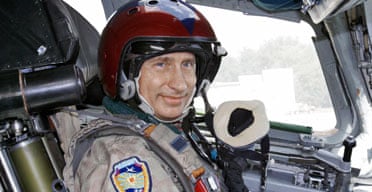Vladimir Putin today ordered the Russian air force to resume the cold war practice of long-range flights by strategic bombers.
"We have decided to restore flights by Russian strategic aviation on a permanent basis," the president told reporters at joint military exercises with China and four central Asian states in the Russian Ural mountains.
Earlier this month, Russian air force generals said bomber crews had flown near a US military base on the Pacific island of Guam, causing US aircraft to be scrambled to track them. The Pentagon said Russian aircraft had not come close enough to US ships for American planes to react.
In a reference to the US, Mr Putin said the halting of long-range bomber flights after the Soviet Union's collapse had affected Russia's security because other nations had continued such missions.
Around 6,000 troops and hundred of armoured vehicles and fighter jets took part in military manoeuvres in the Urals, watched by Mr Putin and his Chinese counterpart, Hu Jintao.
The two men took part in yesterday's regional summit of the Shanghai Cooperation Organisation along with the leaders of a clutch of former Soviet central Asian republics.
The meeting concluded with a thinly veiled warning to the US to keep away from the energy-rich and strategic region.
A statement said: "Stability and security in central Asia are best ensured primarily through efforts taken by the nations of the region on the basis of the existing regional associations."
Without mentioning the US directly, Mr Putin called for a "multi-polar" world order. "Any attempts to solve global and regional problems unilaterally are hopeless," he said.
The SCO, founded 11 years ago, focuses on border security and combating extremism in central Asia.
As well as its full members, Russia, China, Kyrgyzstan, Kazakhstan, Uzbekistan and Tajikistan, Iran, India, Pakistan and Mongolia have signed up as observers in recent years.
The Iranian president, Mahmoud Ahmadinejad, took advantage of the platform to call US missile defence plans that could include stationing missile interceptors in Europe a threat to central Asia.
"These intentions go beyond just one country," he said. "They are of concern for much of the continent, Asia and SCO members."
Moscow and Beijing have developed what they describe as a "strategic partnership" in the region.
Washington supports plans for pipelines that would carry the region's oil and gas to the west and bypass Russia, while Moscow has pushed strongly to control the export flows. China is eyeing the region to secure energy for its booming economy.
This week, the China National Petroleum Corporation announced that Turkmenistan, which is not a member of the SOC, would aim to supply China with 30bn cubic metres of gas annually over 30 years.
In 2005, the SCO called for a timetable for the withdrawal of US troops from two member countries, Uzbekistan and Kyrgyzstan.
The US left Uzbekistan later that year, but Kyrgyzstan still has a US base, which supports operations in nearby Afghanistan. Russia also has a military base Kyrgyzstan.
In another move with cold war overtones, Russia took the BBC's Russian-language FM broadcasts off the air.
The Moscow distributor of the broadcasts said the programmes were "foreign propaganda."
The decision by Bolshoye Radio - and similar moves by two other radio station in the past year - leaves the BBC's Russian-language services available only on medium and shortwave broadcasts, the corporation said in a press release.
